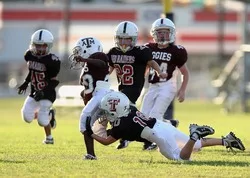
Your child plays a sport with a high incidence of concussions–like football, soccer or hockey–and he or she has had a concussion in that sport. Should you be worried? Maybe, according to a recent study by physical medicine and rehabilitation physicians.
The study found that youth patients with mild to moderate brain injuries are two times more likely to develop attention problems; patients with severe injuries are five times more likely to develop ADHD. However, there is a sliver of good news. The researchers at Cincinnati Children’s Hospital have also discovered that the family environment plays a role in whether and how these problems develop. More specifically:
However, physicians and scientists still cannot fully predict how well patients will recover following traumatic brain injury and do not understand all the factors that influence that recovery. And since 630,000 children and teenagers are seen in emergency rooms for traumatic brain injury every year–and experts estimate the actual number of children affected each year may be closer to 2,000,000 since many see a primary care doctor or no doctor at all after a concussion–this issue is critical. 2
Researchers at Cincinnati Children’s are currently working to discover how genes play a role in recovery and how aerobic training following traumatic brain injury may improve symptoms. Investigators there have also developed a web-based program providing helpful resources to families of children with traumatic brain injuries. It is called I-Interact.
In the meantime, it is up to all of us to do what we can to protect our children, from demanding that teams wear protective headgear; to banning especially dangerous practices within a sport, like headers in soccer at a young age; to questioning the benefits of full-contact football for kids; following doctor protocol after a head injury; or even pulling our child from a sport if he or she has had more than one concussion.
The ideal is to prevent a traumatic brain injury, but if that is not possible, the next best thing is to give your child the best chance for a full recovery. After all, most children will not go on to become professional athletes, but all of them will need to use their brains for the rest of their lives.
Meg Collins contributed to this blog.
1 https://www.cincinnatichildrens.org/news/release/2017/traumatic-brain-injury-effects

"*" indicates required fields